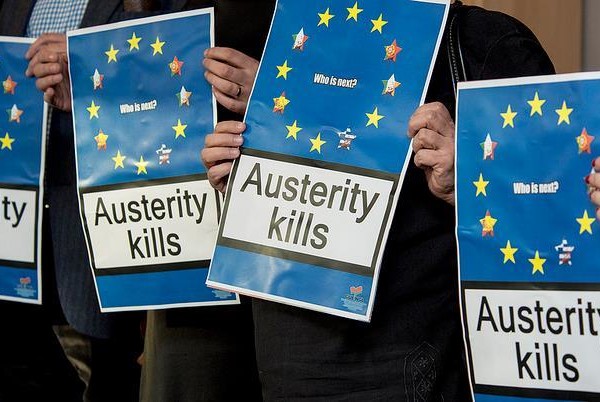Speech on the need for an antifascist foreign policy at the Enhedslisten Party Congress in Copenhagen on June 7th 2025.
Dear friends and comrades,
Thank you for the opportunity to speak here, on this important topic.
Russia’s full scale war in Ukraine, the re-election of Donald Trump and the rise of the extreme right around the globe has meant big changes in global politics, in global power relations and in global security. These are changes that we on the left also are forced to respond to, by taking these developments into consideration in our own analysis on foreign and security policy.
This is not always an easy task. It is in the DNA of the left to resist militarization, to talk about peace instead of war and to focus on a comprehensive concept of security, emphasizing the dangers of environmental disasters and the role of social policy in creating lasting security.
But this moment requires more of us. Just stating that we resist war and resist a society built around the military-industrial complex ignores the ideological aspect of what is happening in the world at the moment. It ignores the most important global shift that has taken place: the clear turn towards stronger authoritarianism in the major powers. For this indeed a more progressive alternative is needed.
“War” has an ideology, “war” has been initiated by someone who has a name and address, but most of all – a clear policy. Authoritarian right wing leaders such as Putin and Netanyahu are willing to use conventional warfare, repression and even genocide to advance their own political aims.
The rise of authoritarianism in major powers currently poses the greatest threat to peace and stability throughout the world, especially when combined with the rapid erosion of respect for international law and its institutions.
Dear friends,
The authoritarian right is attacking freedoms and fundamental rights of individuals and groups within their own countries, and the freedom and independence of other states. When fascism attacks, you must defend the freedom of yourself and others. Sometimes that needs to be done by taking up arms.
Therefore it is essential for the left to use the right words for what is happening and what we are up against. Instead of positioning ourselves against “arms”, we stand in defence of freedom, of democracy, of pluralism and human rights. We are opposed to the right wing imperialist authoritarian right, and what we must develop is a foreign policy based on opposing neo-fascism and authoritarianism. An antifascist foreign policy.
The liberal right made the mistake of turning a blind eye to authoritarianism as long as it was directed at vulnerable groups. Putin’s autocracy was not a problem for the right wing as long as it only manifested itself in the oppression of the country’s own minorities and the restriction of the freedom of the opposition.
In the case of Putin and Russia, we saw a development that often occurs in systems that are becoming totalitarian: first, repressive measures are directed at already vulnerable groups. Step by step, political freedoms are being curtailed to include everyone who disagrees with the government’s policies. Now there is no political freedom in Russia. In 2022, this ideology led to an imperialist foreign policy in the form of a large-scale war of aggression in Ukraine.
The US has much stronger democratic structures and traditions than Russia or China, but that does not change the fact that Donald Trump also represents an authoritarian ideology and that rule of law is in jeopardy in the US. This is evident in the way the Trump administration has attacked minority groups such as transgender people and immigrants. It is also evident in efforts to restrict freedom of speech at universities and in attempts by Trump to take away the right of federal employees to collective bargaining, as well as in the numerous statements regarding Greenland, the Panama Canal and Ukraine. People in Trump’s administration, like Elon Musk and JD Vance, have repeatedly and clearly expressed their support for the European extreme right, such as Vox in Spain, RN in France, and AfD in Germany.
In the case of Trump, we see the inability of the right wing leaders to respond to authoritarianism. Until now, the strategy toward Trump has been appeasement, because “it’s the only thing that works.” At the same time, it is said that Putin only understands power. When it comes to the United States, many are prepared to appease a president who openly supports the far right and has a contemptuous attitude toward democracy and human rights. If we were to do the same regarding any other country or authoritarian leader it would sound unbelievable.
These developments are also strengthening leaders who represent similar ideologies elsewhere. Netanyahu is committing genocide in Gaza under the eyes of the Western world. Erdogan has strengthened his attacks on the opposition and journalists in Turkey. In Hungary, Orbán has just introduced new legislation to parliament that would make it possible to suppress all that remains of the independent media, the opposition and civil society.
Dear friends,
Silence and subservience cannot be the answer. That will not stop the developments we have seen in Russia. Nor can mere preparations for war be the answer, nor the rejection of all weapons.
There needs to be a broader understanding of how international politics and defence policy can strengthen structures and political co-operation that promote stability, democracy, and international law—while taking seriously the threat posed by authoritarian leaders and the return of fascism today.
At least the following principles must be taken as the starting point for an anti-fascist foreign and security policy.
Adequate defense capabilities
In a situation where authoritarian leaders like Putin are prepared to use force and conventional warfare, we cannot simply respond by saying we oppose militarisation. When fascism attacks with weapons, you must be able to defend yourself. Strengthening European defense must be about building adequate defense capabilities. There is nothing un-leftist about this; on the contrary, a credible national defense was for a very long time the Finnish left’s alternative to military alliances and Nato-membership. This principle still applies: a sufficiently strong defense capability raises the threshold for being attacked, but that does not mean that these capabilities should be used to attack or for military operations abroad.
At the same time, it is clear that the right wing is seeking to exploit the current international situation for rearmament to a level that goes far beyond what is necessary for defense. Demands for spending more than 3% of GDP on defense or for €800 billion in investments at the EU level are so excessive that there is a risk of massive cuts in areas such as climate action, social security, and services. While it is important to reject such demands, it is also important to avoid categorically rejecting defense spending. And when investements in defense are made, they should be used as leverage to strengthen European industrial policy.
The position of the Finnish left has been to reject a target locked at a certain level of GDP. We have instead stated that we are willing to discuss and accept investment on a case-by-case basis, depending on whether the investment is needed to secure credible defence capabilities. That also means the spending level can change, depending on the situation. At best, pooling defence resources at the European level and increasing cooperation can free up some resources for other uses since not every member country needs all the same defence gear.
Strengthening the status of International Law
One of the most worrying developments of our time is the erosion of respect for international law at a time when authoritarianism is on the rise. The EU member states and the wider Western bloc bear a key responsibility for this development, having demonstrated an unforgivable inability and unwillingness to defend the fundamental rules of international law regarding the genocide in Gaza.
Despite an arrest warrant issued by the International Criminal Court, the Israeli prime minister has been able to travel to EU countries. Finland has passed a law to close the Eastern border, in open contradiction with international human rights law treaties and EU law and is now about to withdraw from the Ottawa Treaty banning anti-personnel landmines. The Danish government recently criticized the European Convention on Human Rights. All of these statements and actions contribute to the erosion of a multilateral rules-based order.
To counterbalance this development, we need a new international coalition of countries that consciously seek to strengthen the structures of international law. We need strong pushes for reforms of the UN system, voices emphasizing respect for existing rules, making use of existing institutions, and actively participating in them. And above all: we need consistent action instead of double standards.
Building new alliances with the global South
The double standards of the so-called Western countries have also led to a deepening of the divide between the global North and global South at a time when a broad international alternative to the policies of the far right is needed.The simultaneous decisions by several Western countries to drastically cut development cooperation funds further exacerbates this trend. We need more extensive co-operation than ever before to adapt and respond to environmental crises. New alliances, initiatives and joint projects should be found in relation to topics such as global migration, global trade policies, solutions to environmental crises and new technologies, which can serve as a basis for closing the gap that has now emerged. Otherwise we risk losing sympathies of the global south to authoritarian actors who are willing to invest in and defend the legal rights of countries we have neglected.
Program to strengthen autonomy
In an interconnected world, all ties and trade with major powers cannot and should not be cut. However, we should not have critical dependencies on countries whose leaders openly support the far right or do not respect freedom of opinion or speech. Europe must therefore build its own security architecture, not rely on the United States. It must also build its own energy supply, not rely on Russia and the United States. However, reducing dependencies will not be possible without a change of direction in economic policy. Without the possibility of large-scale investment in energy transition and infrastructure, alternative heating systems, and zero-emission transport, reducing dependencies will not be possible.
Dear friends,
These are four components that I at least think should be the basis of a leftist vision for a foreign and security policy in these times. But most importantly – we need a strong progressive movement working together to challenge the rise of the authoritarian extreme right, working for social justice, human rights, democracy – and freedom.



